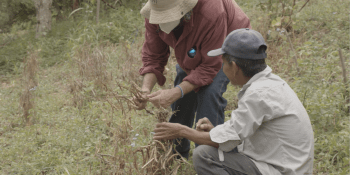Investing in the future: Youth-led research and its role in combating climate change

In order to adapt to a changing climate, the global agriculture sector must tap into the potential of young people.
The world’s population, especially in developing countries, is young. Globally, about 1.8 billion people are between the ages of 10 and 24 years old. While today’s youth benefit from technological advances in nearly every facet of life, they face an incredibly uncertain future thanks to climate change.
Food security is an especially serious concern, compounded by environmental degradation, rapid urbanization and aging farmers. While millions of young people grow up in rural communities, with agriculture serving as the primary source of food and income, there is a disconnect between the importance of agriculture and its reputation as a back-breaking, low status position. It’s not enough, however, to just encourage young people to be farmers. As climate change continues to stress agriculture systems, innovative technologies and research are essential to feeding the world’s growing population. Additionally, young people must have an active and recognized role in shaping policy related to climate change.
International Youth Day is the perfect opportunity to recognize the role of young people in shaping agricultural production, research and policy, especially as the effects of climate change become increasingly acute. This includes supporting young researchers through programs like the Climate, Food and Farming - Global Research Alliance Development Scholarships (CLIFF-GRADS). CLIFF-GRADS provides funding to early career and doctoral researchers from developing countries with the goal of increased knowledge and data on agriculture-based climate change mitigation. In 2019, a record 33 researchers were awarded scholarships through the program.
“We’re delighted to see this talented group of early-career scientists contributing to such a diverse range of research projects in so many regions of the world” said Hayden Montgomery, a Special Representative for the Global Research Alliance on Agricultural Greenhouse Gases (GRA) of the 2019 awardees. “The knowledge being developed by our CLIFF-GRADS fellows will be of vital importance to farmers and policy makers worldwide.”
Where do CLIFF-GRADS come from?
Samuel Weniga Anuga, a 2019 fellow from Ghana, explained the importance of the CLIFF-GRADS award to his development as a scientist, saying “The award for training and collaboration with the CCAFS/GRA scientists is an unparalleled platform for me to gain a better understanding of the science, tools and innovations for greenhouse gas accounting.”
Due to climate change, sustainable agriculture, and by extension food security, is one of the greatest challenges the world has ever faced. Providing opportunities for early career scientists means more youth-led research while also giving young people a platform to impact broader scientific, policy and agriculture sectors.
Read more:
- Webpage: Climate Food and Farming - Global Research Alliance Development Scholarships (CLIFF-GRADS)
- Webinar: Direct measurement approaches to investigating mitigation options in livestock systems
- Webinar: Using modeling, life-cycle assessment, and trade-off analysis to understand low emission options
Webinar: Mitigating climate change through reduced food loss and waste
Climate, Food and Farming - Global Research Alliance Development Scholarships (CLIFF-GRADS) is a joint initiative of the CGIAR Research Program on Climate Change, Agriculture and Food Security (CCAFS) Low Emissions Development flagship and the Global Research Alliance on Agricultural Greenhouse Gases (GRA). Support is provided by CGIAR Trust Fund and bilateral donors to CCAFS, as well as the governments of New Zealand and the United States.
Kathlee Freeman is a Communications Consultant for the CGIAR Research Program on Climate Change, Agriculture and Food Security (CCAFS) Gender and Social Inclusion Unit.



